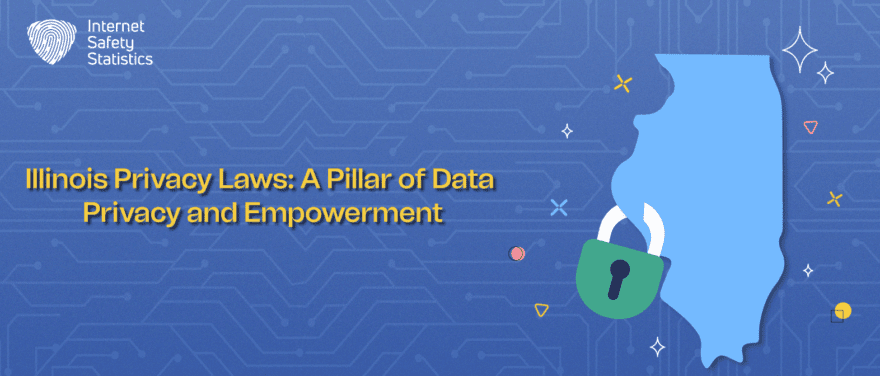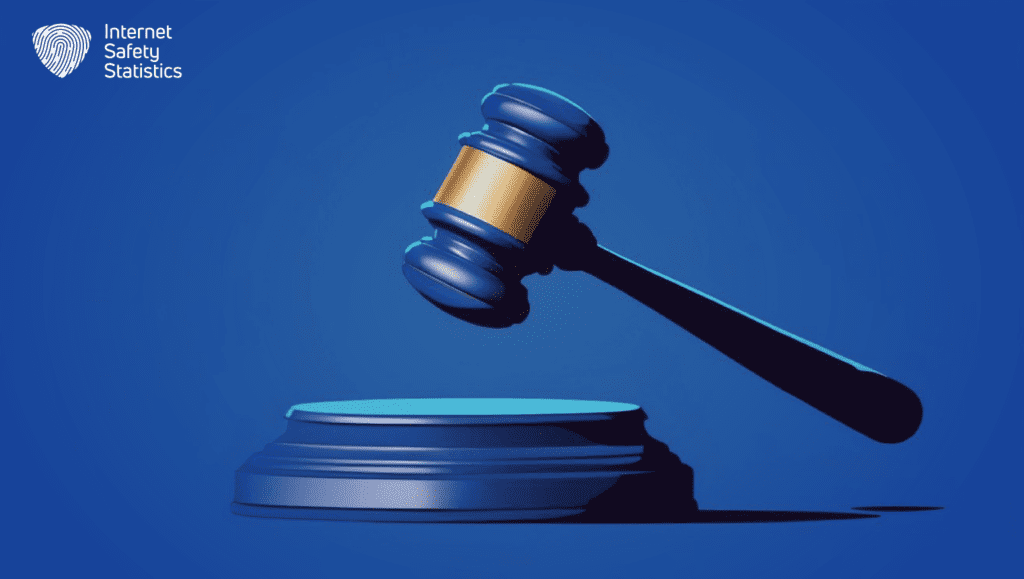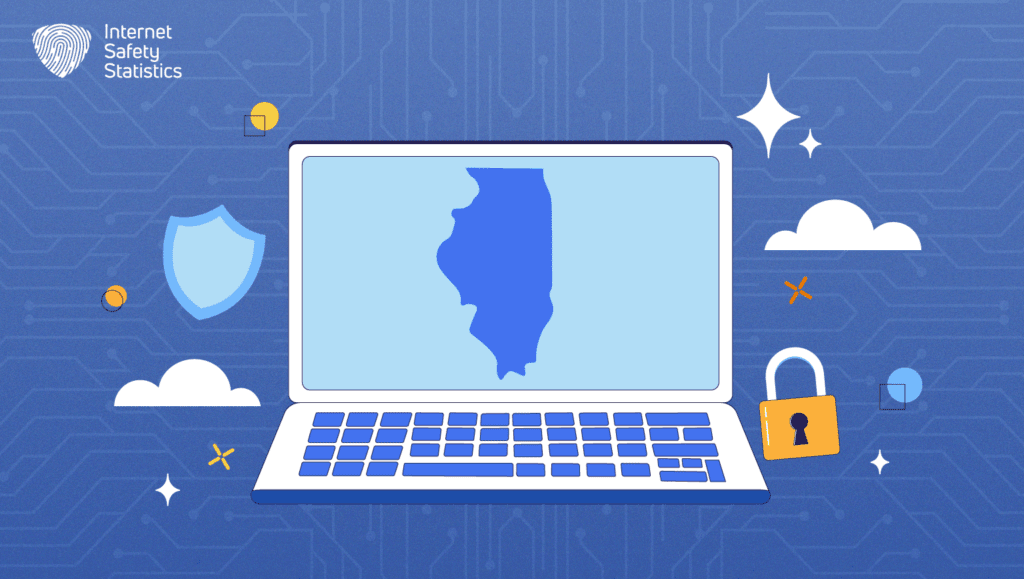
Illinois privacy laws stand as a testament to the state’s commitment to safeguarding the privacy rights of its residents in the dynamic digital landscape.
In recent years, the protection of personal information has emerged as a critical issue for businesses and individuals alike. Recognising the growing importance of privacy, the state of Illinois has enacted several landmark laws aimed at safeguarding the privacy of its residents. These laws, including the Biometric Information Privacy Act (BIPA) and the Illinois Consumer Privacy Act, have significantly impacted businesses that collect, process, or store personal data of Illinois residents.
Illinois privacy laws play a critical role in protecting the privacy rights of its residents and promoting responsible data-handling practices by businesses.
Illinois privacy laws provide a robust framework for protecting the privacy rights of its residents. These rights empower individuals to control their personal information, promote transparency in data practices, and hold businesses accountable for their data collection and use practices.
Historical Context of Illinois Privacy Laws
Illinois has been at the forefront of data privacy legislation in the United States, with a long history of protecting the privacy rights of its residents. The state’s first privacy law, the Illinois Video Voyeurism Act, was enacted in 1971 to criminalise the unauthorised recording or transmission of private images. This law was followed by the Illinois Electronic Surveillance Act in 1984, which regulates the interception of electronic communications.
In 2008, Illinois enacted the Illinois Biometric Information Privacy Act (BIPA), a groundbreaking law that granted individuals broad rights over their biometric information, including fingerprints, facial geometry, and certain other biological identifiers. The BIPA’s stringent requirements on businesses that collect or use biometric data have made it a model for other states and a significant force in the evolution of data privacy law.
The next major milestone in Illinois’s privacy landscape came in 2018 with the passage of the Illinois Consumer Privacy Act. This law, modeled after the California Consumer Privacy Act (CCPA), provides Illinois residents with comprehensive rights over their personal information, encompassing a wide range of data beyond biometric information.
Evolution and Development of Privacy Legislation
Illinois privacy laws have evolved over time in response to changing technologies and growing concerns about data privacy. The BIPA, enacted in 2008, was a response to the increasing use of biometrics, such as fingerprint scanners and facial recognition technology. The CCPA, enacted in 2018, was a response to the broader collection and use of personal information by businesses, particularly in the digital age.
Illinois privacy laws stand have significantly impacted businesses that collect, process, or store personal data of Illinois residents. Businesses must now comply with a complex set of requirements, including obtaining informed consent from individuals, providing access to personal information, and implementing security measures to protect data from unauthorised access or disclosure.
Milestones and Key Amendments in Illinois Privacy Laws
Here are some key milestones and amendments in Illinois’s privacy laws:
- 1971: Illinois Video Voyeurism Act enacted, prohibiting unauthorised recording or transmission of private images.
- 1984: Illinois Electronic Surveillance Act enacted, regulating the interception of electronic communications.
- 2008: Illinois Biometric Information Privacy Act (BIPA) enacted, granting individuals broad rights over their biometric information.
- 2016: BIPA amended to clarify the definition of “biometric information” and to require businesses to provide annual reports on their biometric data practices.
- 2018: Illinois Consumer Privacy Act (CCPA) enacted, providing Illinois residents with comprehensive rights over their personal information.
- 2023: CCPA effective, granting individuals the right to opt out of the sale of their personal information.
These milestones and amendments demonstrate Illinois’s commitment to protecting the privacy of its residents and its willingness to adapt its laws to address evolving privacy concerns. As technologies continue to develop and data collection practices evolve, it is likely that Illinois will continue to play a leading role in shaping data privacy law in the United States.
Core Principles of Illinois Privacy Laws

Illinois has established a comprehensive framework of privacy laws that protect the rights of its residents and regulate the collection, use, and disclosure of personal information. The Illinois Privacy laws are based on several core principles that emphasise transparency, individual control, and accountability.
1. Transparency and Notice: Businesses must provide clear and transparent information about their data collection practices, including the types of data collected, how the data is used, and with whom it is shared. This information must be readily accessible to individuals and must be provided in a clear and concise manner.
2. Individual Control: Individuals have the right to access, correct, and delete their personal information. They also have the right to opt out of the sale of their personal information. Businesses must provide individuals with mechanisms to exercise these rights and must respond to requests promptly and effectively.
3. Accountability: Businesses are responsible for complying with Illinois privacy laws and for taking reasonable steps to protect personal information from unauthorised access, use, or disclosure. They must implement appropriate security measures and conduct regular data audits to ensure compliance.
Fundamental Privacy Rights Guaranteed by Illinois Privacy Laws
Illinois privacy laws grant individuals a range of fundamental rights, including:
- Access: The right to access their personal information held by a business.
- Deletion: The right to request the deletion of their personal information under certain circumstances.
- Portability: The right to receive a copy of their personal information in a readily usable format and to transfer it to another business.
- Non-discrimination: The right not to be denied goods, services, or employment based on exercising their privacy rights.
- Do Not Sell: The right to opt out of the sale of their personal information.
Legal Framework Establishing the Basis for Privacy Protections
Illinois privacy laws are based on a comprehensive legal framework that includes:
- The Biometric Information Privacy Act (BIPA): The BIPA, enacted in 2008, grants individuals broad rights over their biometric information, including fingerprints, facial geometry, and certain other biological identifiers.
- The Illinois Consumer Privacy Act (CCPA): The CCPA, effective in 2023, provides Illinois residents with comprehensive rights over their personal information, encompassing a wide range of data beyond biometric information.
- The Illinois Video Voyeurism Act: The Video Voyeurism Act, enacted in 1971, criminalises the unauthorised recording or transmission of private images.
- The Illinois Electronic Surveillance Act: The Electronic Surveillance Act, enacted in 1984, regulates the interception of electronic communications.
This legal framework provides a strong foundation for protecting the privacy of Illinois residents and ensuring that businesses operate in a transparent and accountable manner in their data collection and use practices.
Specific Illinois Privacy Laws
Illinois has enacted several landmark privacy laws that protect the rights of its residents and regulate the collection, use, and disclosure of personal information. These laws, including the Biometric Information Privacy Act (BIPA), the Illinois Consumer Privacy Act (CCPA), and the Electronic Surveillance Act (ESA), are among the most stringent privacy laws in the United States.
Biometric Information Privacy Act (BIPA)
The Biometric Information Privacy Act (BIPA), enacted in 2008, grants individuals broad rights over their biometric information, which includes fingerprints, facial geometry, and certain other biological identifiers. The BIPA is considered a model for data privacy laws in the United States due to its stringent requirements on businesses that collect or use biometric data.
Key Provisions of the BIPA:
- Notice and Consent: Businesses must obtain informed consent from individuals before collecting biometric data. This consent must be specific and conspicuous, and individuals must be provided with clear information about how their biometric data will be used.
- Access and Correction: Individuals have the right to access their biometric data and to request the correction of any inaccuracies.
- Deletion: Under certain circumstances, individuals have the right to request the deletion of their biometric data.
- Security: Businesses must take reasonable steps to protect biometric data from unauthorised access, use, or disclosure.
- Data Breach Notification: Businesses must notify individuals of any unauthorised access or disclosure of their biometric data.
California Consumer Privacy Act (CCPA)
The California Consumer Privacy Act (CCPA), enacted in 2018, provides Illinois residents with comprehensive rights over their personal information. The CCPA is modeled after the California Consumer Privacy Act (CCPA) and extends privacy rights beyond biometric data to encompass a wide range of personal information collected by businesses.
Key Provisions of the CCPA:
- Access and Portability: Individuals have the right to access their personal information and to receive a copy of it in a readily usable format. They also have the right to request the transfer of their personal information to another business.
- Deletion: Individuals have the right to request the deletion of their personal information, subject to certain exceptions.
- Do Not Sell: Individuals have the right to opt out of the sale of their personal information.
- Transparency: Businesses must provide clear and conspicuous information about their data collection practices.
- Accountability: Businesses must comply with the CCPA and implement appropriate data security measures.
Illinois Electronic Surveillance Act (ESA)
The Illinois Electronic Surveillance Act (ESA), enacted in 1984, regulates the interception of electronic communications. The ESA prohibits the unauthorised interception or disclosure of electronic communications, including phone calls, text messages, and emails.
Key Provisions of the ESA:
- Interception: The ESA prohibits individuals from intercepting electronic communications without the consent of all parties involved in the communication.
- Disclosure: The ESA prohibits individuals from disclosing electronic communications they have intercepted without the consent of all parties involved in the communication.
- Exceptions: The ESA includes several exceptions to the interception and disclosure prohibitions, such as law enforcement investigations and disclosures authorised by a court order.
Obligations Imposed on Businesses Regarding Data Protection
Illinois is a pioneer in data privacy legislation, with two landmark laws, the Biometric Information Privacy Act (BIPA) and the Illinois Consumer Privacy Act (CCPA), regulating how businesses collect, use, and store personal information about Illinois residents. These laws impose a range of obligations on businesses operating in Illinois, including:
1. Notice and Consent
- Businesses must provide clear and conspicuous notice to Illinois residents about their data collection practices, including the types of personal information collected, the purpose for collection, and the third parties with whom the data may be shared.
- For biometric data, businesses must obtain informed, specific, and prior written consent from Illinois residents before collecting, using, or disclosing their biometric information.
2. Data Minimisation
- Businesses must collect only the minimum amount of personal information necessary for the specific purpose for which it is collected.
- Businesses must not use personal information for any purpose other than those for which it was initially collected unless they obtain the express consent of the Illinois resident.
3. Data Security
- Businesses must implement and maintain reasonable security measures to protect personal information from unauthorised access, use, disclosure, alteration, or destruction.
- Businesses must conduct regular assessments of their data security practices to identify and address any potential vulnerabilities.
4. Access, Correction, and Deletion
- Illinois residents have the right to request access to their personal information held by businesses.
- Illinois residents have the right to request the correction of any inaccurate or incomplete personal information held by businesses.
- Illinois residents have the right to request the deletion of their personal information under certain circumstances, such as when the information is no longer necessary for the purpose for which it was collected.
5. Do Not Sell
- Businesses must provide Illinois residents with the ability to opt out of the sale of their personal information to third-party businesses.
- Businesses must honor opt-out requests promptly and effectively.
Enforcement and Penalties of Illinois Privacy Laws

Illinois privacy laws have established robust mechanisms to enforce its laws, ensuring compliance and imposing penalties for non-compliance. Businesses that fail to adhere to the requirements of the Biometric Information Privacy Act (BIPA) or the Illinois Consumer Privacy Act (CCPA) face significant legal consequences.
Enforcement Mechanisms
The primary responsibility for enforcing Illinois privacy laws rests with the Illinois Attorney General’s Office (IAG). The IAG has the authority to investigate alleged violations, issue subpoenas, and bring civil actions against businesses that fail to comply with BIPA or CCPA.
In addition to the IAG’s enforcement efforts, individuals who have suffered harm due to a business’s violation of BIPA or CCPA may also bring private civil actions. These lawsuits can result in substantial damages for individuals, including:
- Actual damages: Compensation for the financial losses and other harm caused by the violation.
- Statutory damages: Penalties of up to $5,000 per violation for BIPA and $7,500 per violation for CCPA.
- Attorney’s fees: The costs of hiring an attorney to represent the individual in the lawsuit.
Penalties for Non-Compliance
The penalties for non-compliance with Illinois privacy laws can be severe. Businesses face both administrative and civil penalties for violating BIPA and CCPA.
Administrative Penalties:
- BIPA: The IAG may impose administrative penalties of up to $1,000 per violation for negligent violations and up to $5,000 per violation for willful or knowing violations.
- CCPA: The IAG may impose administrative penalties of up to $7,500 per violation for intentional violations and up to $15,000 per violation for willful or reckless violations.
Civil Penalties:
- BIPA: Individuals may bring private civil actions against businesses that violate BIPA and seek damages, including actual damages, statutory damages, and attorney’s fees.
- CCPA: Individuals may bring private civil actions against businesses that violate CCPA and seek damages, including statutory damages of up to $750 per violation for unintentional violations and up to $1,500 per violation for intentional violations or violations arising from a pattern of neglect.
Comparisons with Federal Privacy Laws
Illinois has taken a proactive stance in protecting consumer privacy, establishing comprehensive data privacy laws, including the Biometric Information Privacy Act (BIPA) and the Illinois Consumer Privacy Act (CCPA). These laws have set a high standard for privacy protection and have influenced the development of federal privacy legislation.
Contrasting Illinois Privacy Laws with Federal Counterparts
While Illinois privacy laws have served as a model for federal privacy legislation, there are some key differences between the two approaches:
- Scope: Illinois privacy laws apply to businesses that collect personal information from or about Illinois residents, regardless of the company’s headquarters location. In contrast, federal privacy laws, such as the General Data Protection Regulation (GDPR) and the California Privacy Rights Act (CPRA), may have broader territorial reach, applying to businesses with significant ties to the United States.
- Substantive Provisions: Illinois privacy laws, particularly BIPA, have more stringent requirements for biometric data collection and use. For instance, BIPA requires businesses to obtain informed consent for biometric data collection and to implement strict data security measures.
- Enforcement: Enforcement of Illinois privacy laws is primarily handled by the Illinois Attorney General’s Office. Federal privacy laws may have a more decentralised enforcement structure, relying on multiple agencies or individual lawsuits.
Synergies and Differences in Regulatory Approaches
Despite these differences, Illinois privacy laws have influenced the development of federal privacy legislation in several ways:
- Raised Awareness: Illinois’s strong privacy protections have raised awareness of the importance of data privacy among businesses and consumers, creating momentum for federal action.
- Established Precedent: Illinois privacy laws have established precedents for consumer privacy rights and data handling practices, providing guidance for federal lawmakers.
- Driven Innovation: Illinois privacy laws have spurred the development of innovative privacy-enhancing technologies and data governance practices, which could be adopted in federal legislation.
Conclusion
Illinois has emerged as a pioneer in data privacy protection, spearheading the development and implementation of comprehensive privacy laws that have significantly impacted the tech and healthcare industries. These laws, including the Biometric Information Privacy Act (BIPA) and the Illinois Consumer Privacy Act (CCPA), have established a higher standard for privacy protection, empowering individuals with greater control over their personal information and holding businesses accountable for their data collection and handling practices.
The impact of Illinois privacy laws extends beyond the state’s borders, influencing the development of federal privacy legislation and setting a benchmark for other states to follow. As the digital landscape continues to evolve and the collection and use of personal information become increasingly pervasive, Illinois’s proactive approach to privacy protection serves as a crucial model for upholding individual rights and ensuring a responsible and secure data ecosystem.
